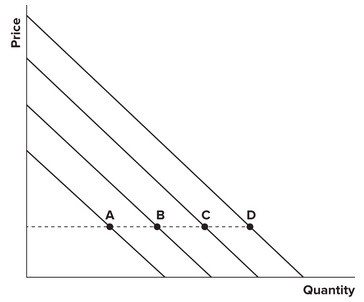Answer the following statement true (T) or false (F)
1) The limited money income of consumers results in a so-called budget constraint.
2) A rational consumer will cease purchasing a product at that quantity where marginal utility
begins to diminish.
3) When a consumer is maximizing total utility, he or she cannot increase total utility by
reallocating expenditures among different products.
4) When the price of a product falls, the income effect induces the consumer to purchase more of
it while the substitution effect prompts her to buy less.
1) T
2) F
3) T
4) F
You might also like to view...
In 2006, the United States had
A) a surplus in the current account. B) a balance in the current account. C) a deficit in the current account. D) From 2006 data, it is too difficult to determine whether a surplus or a deficit existed in the current account. E) a positive balance of net financial flows.
Refer to the following graph. Elasticity is smallest at which point?
Elasticity is smallest at which point?
A. A B. B C. C D. D